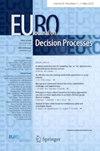Recovery of urban socio-technical systems after disaster: quasi-optimality of reactive decision-making based planning
Abstract
The present work is devoted to the problem of city recovery management after a large scale disaster. A modern city is represented as a complex urban socio-technical system consisting of three interdependent parts: a physical lifeline system, citizens’ daily life demand, and service systems. The functioning of the last two ones directly depends on the connectivity of the physical lifelines. In cases when all the consequences of a large scale disaster are known and the system damage can be evaluated withing high accuracy researches in the field of recovery of socio-technical systems mainly use different optimization methods of recovery plan generation using various objective functions. However, the recovery of urban socio-technical system in the case of non-reliable information requires another approach. At the initial time moment collecting the information about the system state can be hindered by many causes and possible cascading failures in the infrastructure system lead to the reassessment of the city damage. The applicability of an optimization technique to the recovery management in such cases is rather troubled. The process of recovery planning should be very adaptive to such changing conditions. We developed a method of recovery management based on the reactive decision-making. It uses the step-by-step realization logic which can be applied to the recovery management under significant information uncertainties. In the present paper, we summarize the basic logic of the novel method, results of numerical simulation that demonstrate its applicability to the recovery management in cases of initial lack of information. Besides, the comparison of this approach with the result obtained by the optimization technique demonstrates the quasi-optimality of the reactive decision-making based approach of the city recovery planning.

 求助内容:
求助内容: 应助结果提醒方式:
应助结果提醒方式:


